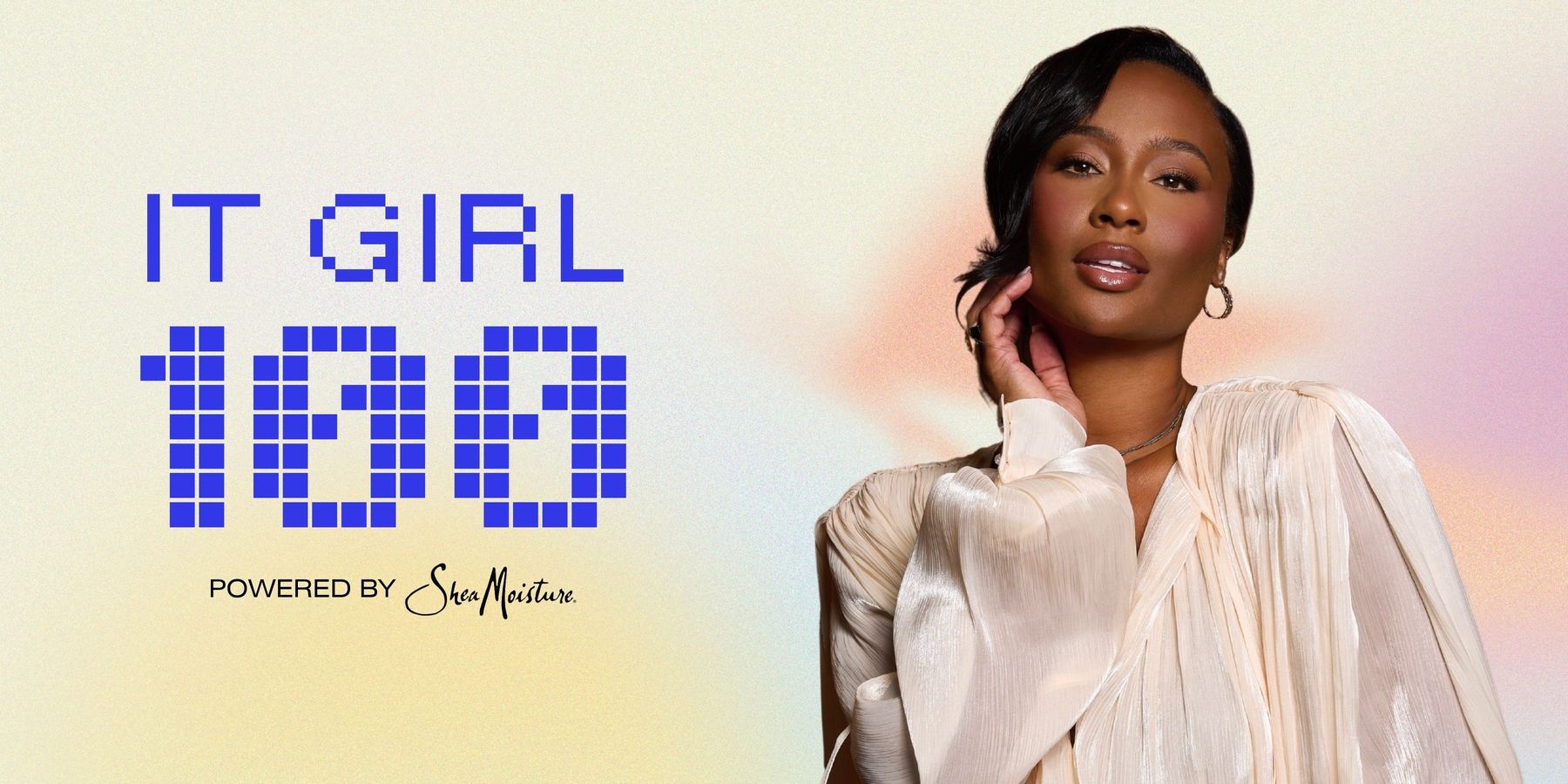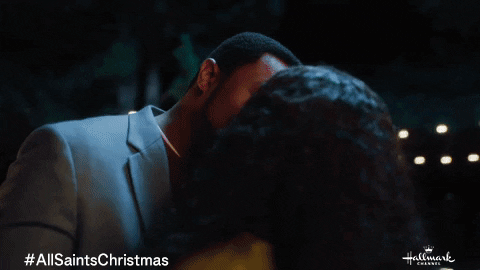
On any given day, a crowd of fans wait eagerly outside of the Slutty Vegan, chatting eagerly about whether they want a Sloppy Toppy or a Ménage à Trois as they wait in hour-long lines. No, this isn't a twisted version of the movie Trois -- unless you count indulging in salacious yet savory food as a form of foreplay.
In fact, just a few months ago many of these patrons wouldn't have thought twice about traveling down to the primarily African-American Southwest Atlanta neighborhood. But today, it's not uncommon to see enthused foodies, celebrities, locals and travelers from all races and backgrounds vying for a chance at tasting the restaurant's famous plant-based burgers. In case the headlines weren't clear, Slutty Vegan is revolutionizing the vegan fast food industry, and it's taking the meaning of food porn to the next level.
INSIDE SLUTTY VEGAN WITH FOUNDER PINKY COLEwww.youtube.com
Leading the way is founder Pinky Cole. With her red, shoulder-length locs, radiating smile, and confidence that permeates any room she enters, Pinky is focused on her vision of making enjoyable vegan food a worldwide phenomenon. "Slutty Vegan [isn't] slowing down anytime soon," says Pinky. "It's going to be alongside the Burger Kings, McDonalds, and Sonics of the world."
Taking a break from her never-ending to-do list, Pinky and I chat about her journey to creating one of the most buzzworthy restaurants in Atlanta and the vegan community, and how she was able to launch and scale her business from concept to a brick-and-mortar restaurant all within a year. It's not long into our conversation that I realize that the key to her success is rooted in two concepts: the power in execution after inspiration and the importance of capitalizing off of momentum. This— and her desire to serve— is what is driving her to turn her idea into a worldwide phenomenon.
"I come as one, but I stand as 10,000. You see me, but I am the representation of so many people that look like me, brown skin and locs— people that don't fit society's norm. I am the representation of successful Black business. There is [a] tax on Black-owned business, that we don't do well. [Slutty Vegan] is changing the game of what Black business looks like. It's a big deal to know that I am able to create something as a Black woman that is successful and bring our stock to the next level."
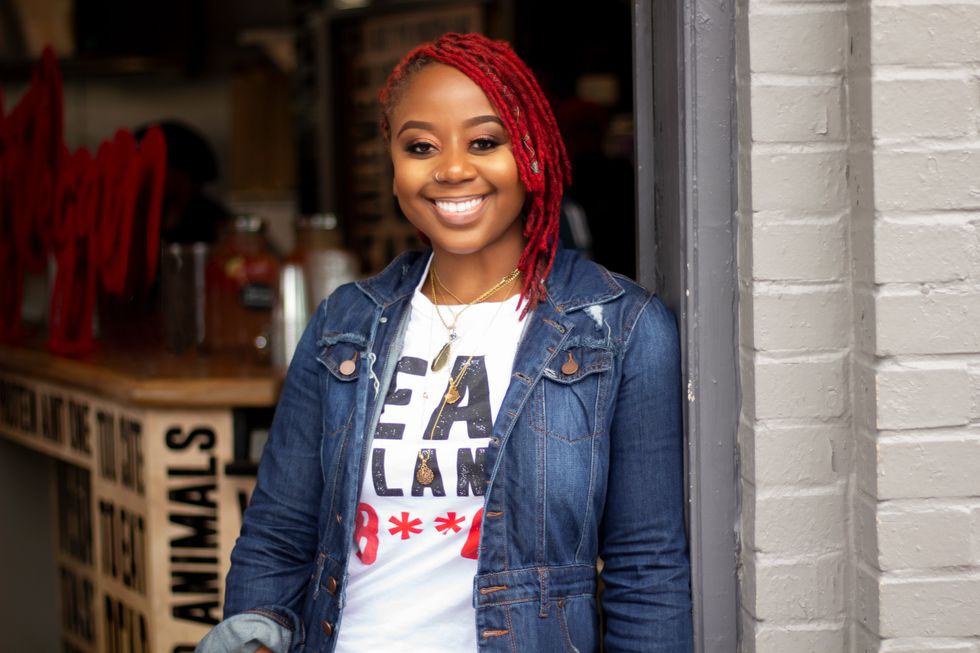
Photo by Tailiah Breon for xoNecole
"I am the representation of successful Black business."
Opening her own restaurant wasn't always the end destination for Pinky. After graduating from Clark Atlanta University she moved to Los Angeles to pursue her dream of acting, but a chain of events led her to her culinary destiny. While in Los Angeles, a sorority sister offered Pinky a position to work as a TV producer. This opened the doors to various roles in the industry, which eventually led her to work with The Maury Show. During this time, Pinky, who loved all things food and business since her youth (and was taught to cook by her Jamaican grandmother), decided to take the money she had saved from her day job to open up her first venture in Harlem: Pinky's Jamaican and American Restaurant.
It was there she experienced her first major setback. "I ended up losing the restaurant due to a grease fire," she says. "It seemed like a failure, but it was the best thing that ever happened."
Soon after, Pinky moved back to Atlanta to work as a casting director for another popular TV show. Being a part of the show's production team allowed her the space to heal from the trauma of losing a business, while also helping to heal and serve others. It wasn't long before she'd have the desire to try her hand at entrepreneurship again. Just a few months into her transition back south, a million-dollar idea was born. "I was sitting in the house one day and I came up with this idea of Slutty Vegan. It came to me like a light bulb. [The name] was sexy. It sounds like it's selling sex, but it's bigger than that. [I knew] it was going to become a movement; it's going to get people to pay attention to being plant-based and veganism."
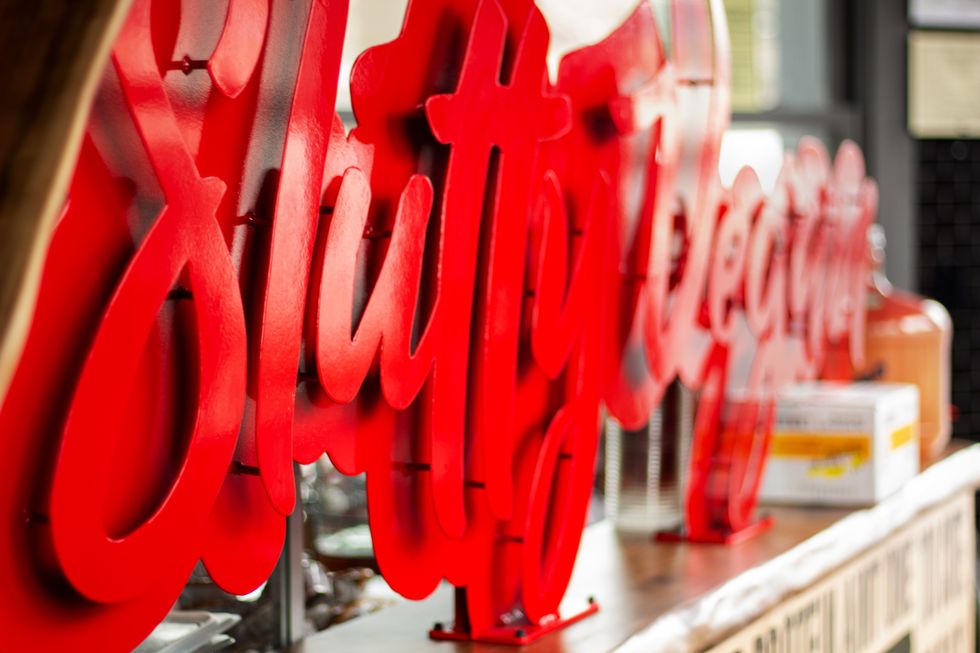
Photo by Tailiah Breon for xoNecole
"It sounds like it's selling sex, but it's bigger than that."
Unlike many who may experience these moments of entrepreneurial epiphanies, Pinky didn't just sit on the idea. She started creating recipes, finding supplier partners, and researching how to expand. In July 2018, she set up shop at a shared kitchen to test out her newly-created cuisine. By August, she moved to a commercial kitchen, invested in a food truck in September, and in October found the location for the first Slutty Vegan restaurant. Three months later, a crowd of 1,200 gathered outside the restaurant in 45-degree weather for the grand opening. "It was so beautiful to see so many people looking like me come out in the name of food," she recalls.
Since its opening in January, the Atlanta-based restaurant has become a mini tourist attraction, with customers lining up as much as two hours in advance of the store's daily opening. Occasionally, the line wraps around the corner with wait times hitting at least five hours or more.
While success seems to be happening fast for the brand, Pinky isn't surprised. She had a feeling this was going to happen, she tells me matter-of-factly. The Slutty Vegan name alone was a hook that would reel her potential customer base in. "There is [a] stigma to the word. [I thought], 'How can I use a bad word to make it something good, be creative and [help people] indulge in what they love guilt-free?'"
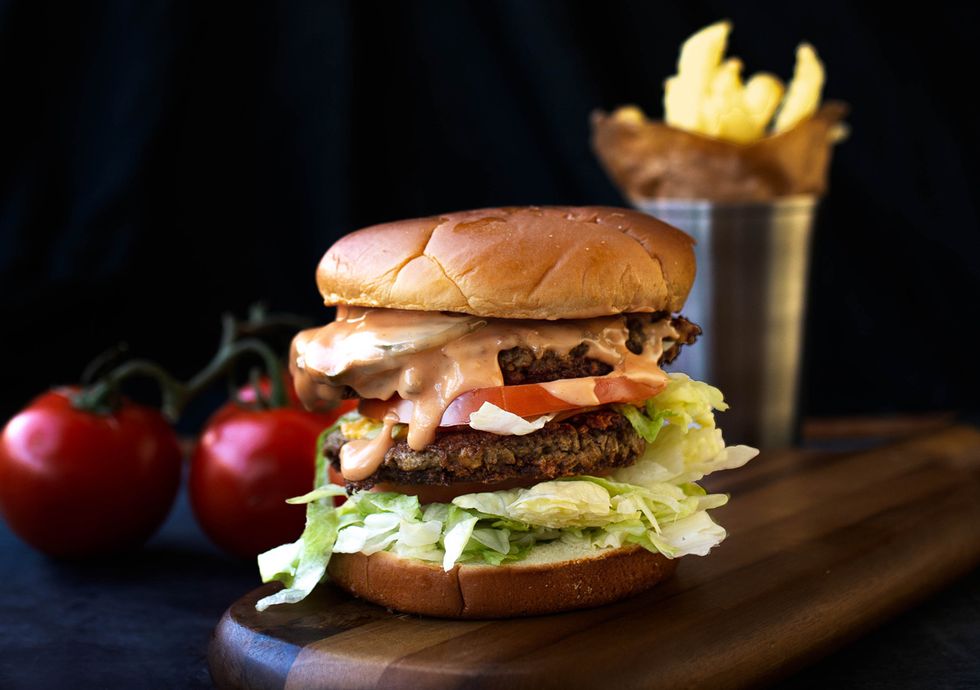
Courtesy of Slutty Vegan
"Veganism can be cool. Being plant-based can be cool. It doesn't have to be mundane."
Such indulgences include the Fussy Hussy— an Impossible Burger patty loaded with pickles, vegan cheese, caramelized onions, lettuce, tomato, and their signature slutty sauce without the cholesterol and calories of a traditional burger. It's the creative genius behind Pinky's idea— and she knows it. "It feels like it's bad because it's a cheeseburger and fries, but it's a lot healthier, which is why the hook to the conversation is you don't have to eat dead animals in order for it to taste good," Pinky says. "We can limit and decrease the amount of illnesses and disease in our community based on the food we ingest. That intention is continuing to be met because it's working."
To no surprise, at the core of the Slutty Vegan branding strategy is experience. Pinky has been deliberate about how she's crafted the way customers interact with the brand since the beginning. "Build your brand in a way that is so irresistible that people have to have it. When people have to have it, they will do whatever to get it. Slutty Vegan has been successful [in] creating an experience for people so that they have to have it by any means necessary," she tells me. "Veganism can be cool. Being plant-based can be cool. It doesn't have to be mundane."
It's why on the Slutty Vegan Instagram you'll hardly see any brand-generated photos of their signature burgers. Pinky also doesn't spend money on influencer marketing, and will tell you in a heartbeat that she's "not selling food." Instead, she's "helping people indulge in what they love."
Even Pinky's celebrity co-signers are genuine, unpaid, and helping to push the brand's message to a larger audience. "When you eat my food as a celebrity, you're jumping on board to this bigger conversation and spreading a narrative of eating healthier and limiting diseases in our community. That's what we call positive manipulation, and it's working."
It's understandable why after tasting her burgers people can't stop eating or talking about Pinky Cole and Slutty Vegan. There's something magical about the way the brand has been able to sprout out of nowhere and dominate the food scene. It leaves little room for doubt as to where Pinky plans on taking her company. "In 2019, you have to do things that are going to separate you from everyone else," she says.
While I'm not sure if Pinky would describe herself as radical, she's definitely a rule-breaker. Going against the norm has enabled her to bring the Slutty Vegan story to the forefront. According to Pinky, moving the food truck location daily is not usually a food truck culture norm, but Slutty Vegan does it anyway. Using provocative nomenclature in brand marketing could also be seen as risky, but despite all of this, Pinky believes that her desire to change the rules of how to start and run a business have helped fuel the company's success. If you're thinking of ways to engage with customers or influence sales, thinking outside the box can lead to breakthroughs that can ultimately fuel growth.
However, no hero's journey is complete without a major test of character and commitment to their dream.
Slutty Vegan was invited to vend at the 2019 Super Bowl, and Pinky found herself having to make the difficult decision as to whether she'd accept the opportunity or not. She was told that she'd have to change the restaurant's name, branding and wrapping. While the optics and sales would have been great, Pinky realized she would have to compromise on everything she worked hard to create. To Pinky, this wasn't worth sacrificing her brand footprint. She adds with conviction, "I am glad I didn't compromise who I am for the dollar. The people who want me are going to come to me."
The people have been coming alright. The decision alone to launch a vegan restaurant in Atlanta could be the perfect example of "right place, right time." However, it's a reminder of a higher alignment. It shows how sometimes things are supposed to happen as they happen. One of the first things Pinky told me during our chat was, "If [my first] restaurant didn't close, we wouldn't be having this conversation."
"I was supposed to be in Atlanta. [Atlanta is] the home of soul food. It's the South. If you tell people in the South about vegan food, they laugh at you. To be able to do this [here], we've conquered something that is really not a big deal. We've done it and we can go somewhere else and they'll be with the movement. [In] Los Angeles, DC, or New York, veganism is normal. The fact that I am able to do this in Atlanta is dope."
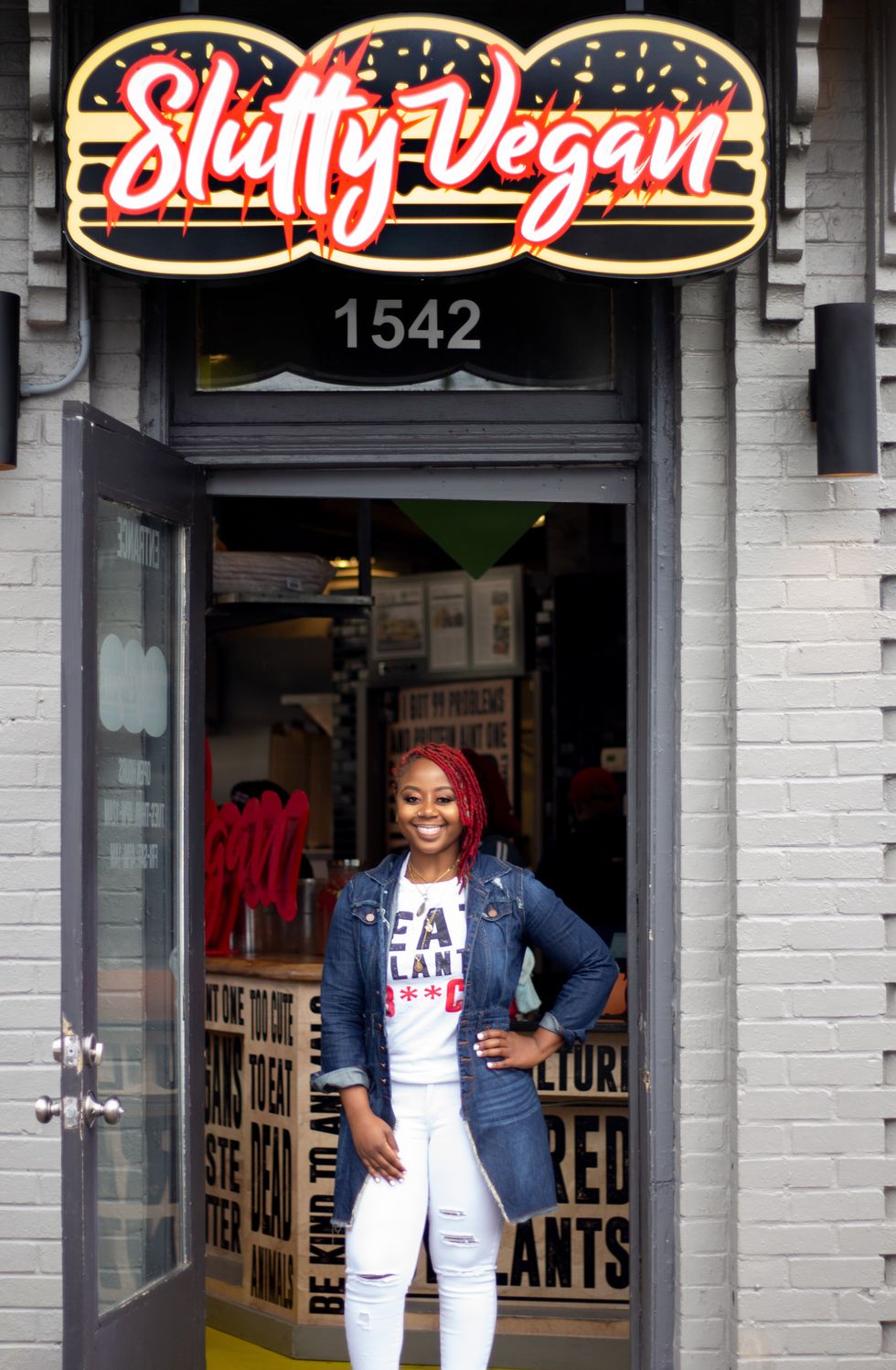
Photo by Tailiah Breon for xoNecole
"If [my first] restaurant didn't close, we wouldn't be having this conversation."
The future of Slutty Vegan seems promising. Pinky tells us that she has several projects in the works, including a development deal for a television show, possible Slutty Vegan airport locations, merchandise, franchising options, and ready-made bottles of her infamous Slutty Sauce for sale.
"If you have a great idea, a lot of faith and are steadfast on your goals, it doesn't take five years to [launch]. You can do what I did in six months and it can be super [successful]. It depends on how bad you want to win."
Like many founders, what's driving Pinky is the impact she has on everything she touches. "While the people are pouring into you, you have to pour back into the people. People will continue to support you if they see you are supporting the community."
Philanthropy and serving others are core values that she ensures surrounds the Slutty Vegan way. It's a mission that is the driving force behind why she looks forward to waking up each day. "This doesn't feel like work," Pinky says. "The refuel is knowing my doors are open every day, having conversations with people like you, to know that I'm responsible for feeding 25 mouths every week. I'm the captain of the ship, and if I fall asleep, the ship is going to sink and I'm not willing to let that happen. I built something that can take our community to the next level."
And we're certainly down to ride the wave.
To learn more about Slutty Vegan and how you can get #sluttified, visit https://sluttyveganatl.com and check out the brand on Instagram at @sluttyveganatl.
- Pinky Cole, Slutty Vegan ATL CEO joins Angie Ange in the Morning ... ›
- Pinky Cole @pinky907 Instagram Photos and Videos • Yooying ›
- This Slutty Ghost Restaurant Keeps Selling Out of Vegan Burgers ... ›
- Celebs are Flocking to New Plant-Based, Black-Owned Burger Joint ... ›
- Inside Her Story: Eat Healthier With 'The Slutty Vegan' | Black ... ›
- Slutty Vegan Starts a New Conversation Around Plant-Based Eating ... ›
- Slutty Vegan is enticing Atlanta foodies to rethink meat - Rolling Out ›
- Atlanta food truck The Slutty Vegan to open in Westview ›
- Slutty Vegan restaurant officially open for business - interview with ... ›
- How Pinky Cole used Instagram to make Slutty Vegan's burgers a ... ›
Exclusive: Viral It Girl Kayla Nicole Is Reclaiming The Mic—And The Narrative
It’s nice to have a podcast when you’re constantly trending online. One week after setting timelines ablaze on Halloween, Kayla Nicole released an episode of her Dear Media pop culture podcast, The Pre-Game, where she took listeners behind the scenes of her viral costume.
The 34-year-old had been torn between dressing up as Beyoncé or Toni Braxton, she says in the episode. She couldn’t decide which version of Bey she’d be, though. Two days before the holiday, she locked in her choice, filming a short recreation of Braxton’s “He Wasn’t Man Enough for Me” music video that has since garnered nearly 6.5M views on TikTok.
Kayla Nicole says she wore a dress that was once worn by Braxton herself for the Halloween costume. “It’s not a secret Toni is more on the petite side. I’m obsessed with all 5’2” of her,” she tells xoNecole via email. “But I’m 5’10'' and not missing any meals, honey, so to my surprise, when I got the dress and it actually fit, I knew it was destiny.”
The episode was the perfect way for the multihyphenate to take control of her own narrative. By addressing the viral moment on her own platform, she was able to stir the conversation and keep the focus on her adoration for Braxton, an artist she says she grew up listening to and who still makes her most-played playlist every year. Elsewhere, she likely would’ve received questions about whether or not the costume was a subliminal aimed at her ex-boyfriend and his pop star fiancée. “I think that people will try to project their own narratives, right?” she said, hinting at this in the episode. “But, for me personally – I think it’s very important to say this in this moment – I’m not in the business of tearing other women down. I’m in the business of celebrating them.”
Kayla Nicole is among xoNecole’s It Girl 100 Class of 2025, powered by SheaMoisture, recognized in the Viral Voices category for her work in media and the trends she sets on our timelines, all while prioritizing her own mental and physical health. As she puts it: “Yes, I’m curating conversations on my podcast The Pre-Game, and cultivating community with my wellness brand Tribe Therepē.”
Despite being the frequent topic of conversation online, Kayla Nicole says she’s learning to take advantage of her growing social media platform without becoming consumed by it. “I refuse to let the internet consume me. It’s supposed to be a resource and tool for connection, so if it becomes anything beyond that I will log out,” she says.
On The Pre-Game, which launched earlier this year, she has positioned herself as listeners “homegirl.” “There’s definitely a delicate dance between being genuine and oversharing, and I’ve had to learn that the hard way. Now I share from a place of reflection, not reaction,” she says. “If it can help someone feel seen or less alone, I’ll talk about it within reason. But I’ve certainly learned to protect parts of my life that I cherish most. I share what serves connection but doesn’t cost me peace.
"I refuse to let the internet consume me. It’s supposed to be a resource and tool for connection, so if it becomes anything beyond that I will log out."

Credit: Malcolm Roberson
Throughout each episode, she sips a cocktail and addresses trending topics (even when they involve herself). It’s a platform the Pepperdine University alumnus has been preparing to have since she graduated with a degree in broadcast journalism, with a concentration in political science.
“I just knew I was going to end up on a local news network at the head anchor table, breaking high speed chases, and tossing it to the weather girl,” she says. Instead, she ended up working as an assistant at TMZ before covering sports as a freelance reporter. (She’s said she didn’t work for ESPN, despite previous reports saying otherwise.) The Pre-Game combines her love for pop culture and sports in a way that once felt inaccessible to her in traditional media.
She’s not just a podcaster, though. When she’s not behind the mic, taking acting classes or making her New York Fashion Week debut, Kayla Nicole is also busy elevating her wellness brand Tribe Therepē, where she shares her workouts and the workout equipment that helps her look chic while staying fit. She says the brand will add apparel to its line up in early 2026.
“Tribe Therepē has evolved into exactly what I have always envisioned. A community of women who care about being fit not just for the aesthetic, but for their mental and emotional well-being too. It’s grounded. It’s feminine. It’s strong,” she says. “And honestly, it's a reflection of where I am in my life right now. I feel so damn good - mentally, emotionally, and physically. And I am grateful to be in a space where I can pour that love and light back into the community that continues to pour into me.”
Tap into the full It Girl 100 Class of 2025 and meet all the women changing game this year and beyond. See the full list here.
Featured image by Malcolm Roberson
If there is one thing that I am going to do, it’s buy myself some scented soy candles. And, as I was looking at a display of them in a TJ Maxx store a couple of weekends ago, I found myself wondering just who decided which scents were considered to be “holiday” ones. The origin stories are actually pretty layered, so, for now, I’ll just share a few of ‘em.
I’m sure it’s pretty obvious that pine comes from the smell of fresh Christmas trees; however, scents like cloves, oranges, and cinnamon are attributed to two things: being natural ways to get well during the cold and flu season, and also being flavors that are used in many traditional holiday meals.
Meanwhile, frankincense and myrrh originate from the Middle East and Africa (you know, like the Bible does — some folks need to be reminded of that—eh hem — Trumpers) and ginger? It too helps with indigestion (which can definitely creep up at Thanksgiving and Christmas dinner tables); plus, it’s a key ingredient for ginger snaps and gingerbread houses. So, as you can see, holiday-themed scents have a rhyme and reason to them.
Tying this all in together — several years ago, I penned an article for the platform entitled, “Are You Ready To Have Some Very Merry ‘Christmas Sex’?” Well, in the spirit of revisiting some of that content, with a bit of a twist, I decided to broach some traditional holiday scents from the perspective of which ones will do your libido a ton of good from now through New Year’s Eve (check out “Make This Your Best NYE. For Sex. EVER.”).
Are you ready to check some of them out, so that, whether it’s via a candle, a diffuser, some essential oil, or some DIY body cream (check out “How To Incorporate All Five Senses To Have The Best Sex Ever”), you can bring some extra festive ambiance into your own boudoir? Excellent.
1. Vanilla
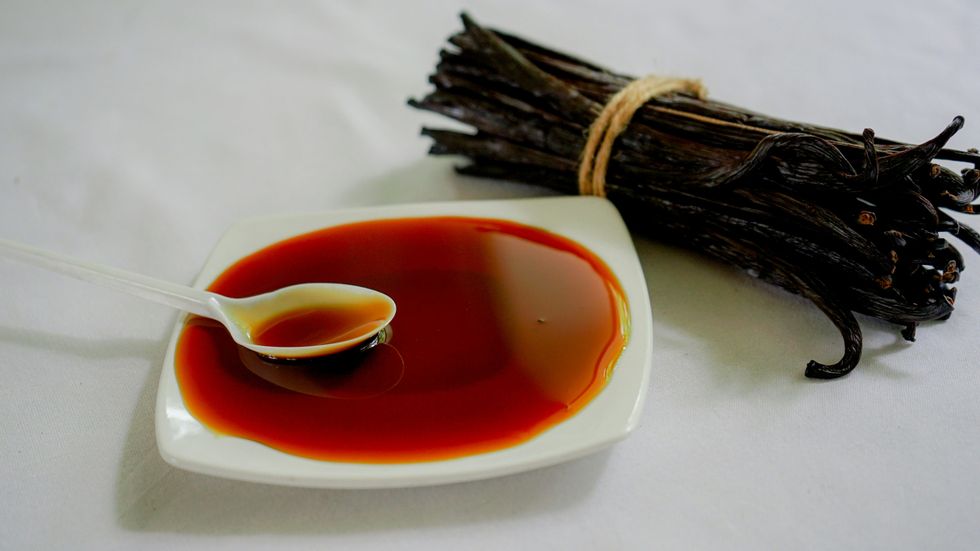
Unsplash
When it comes to holiday desserts, you’re going to be hard-pressed to find recipes that don’t include vanilla — and that alone explains why it is considered to be a traditional holiday scent. As far as your libido goes, vanilla is absolutely considered to be an aphrodisiac — partly because its sweet scent is considered to be very sensual. Some studies even reveal that vanillin (the active ingredient in vanilla) is able to increase sexual arousal and improve erectile dysfunction in men. So, if you adore the smell, here is more incentive to use it.
2. Frankincense

Unsplash
Although, typically, when people think about frankincense (and myrrh), it’s in the context of the gifts that the wise men brought Christ after he was born; it’s a part of the biblical Christmas story. However, frankincense goes much deeper than that. Sexually, since it has an earthy and spicy scent, some people like to use it to meditate (check out “What Exactly Is 'Orgasmic Meditation'?”). Also, since it has the ability to put you in a better mood, soothe and soften your skin and maintain your oral health — with the help of frankincense, every touch and kiss can be that much…sexier.
3. Cinnamon
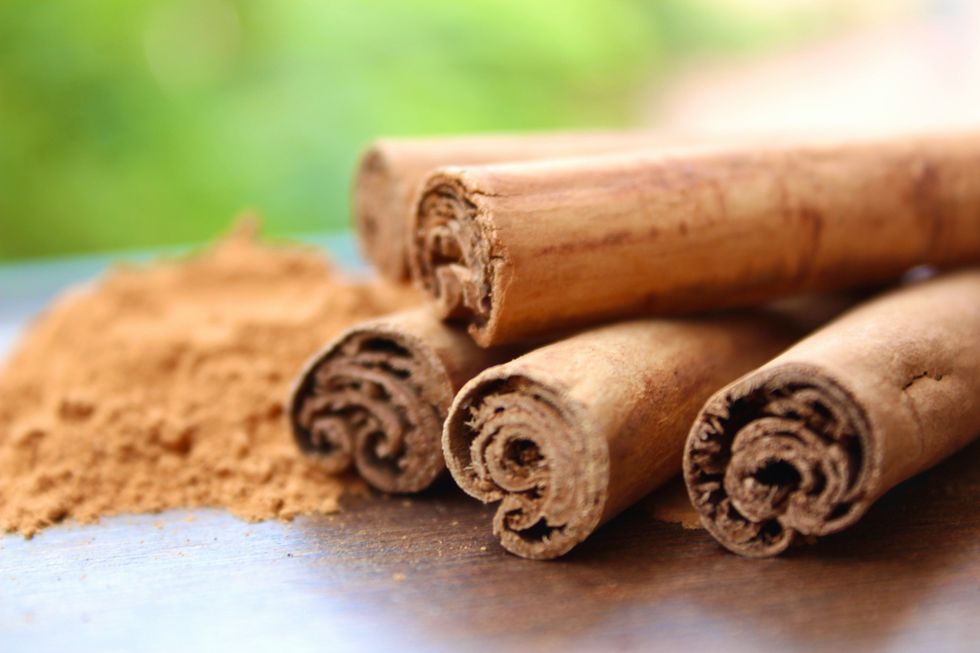
Unsplash
I already gave cinnamon a shout-out in the intro. Personally, I’ve been a fan of it, in the sex department, for a long time now (check out “12 ‘Sex Condiments’ That Can Make Coitus Even More...Delicious”). When it’s in oil form, it can be very sweet to the taste while sending a warm sensation throughout the body — which is why the giver and receiver of oral sex can benefit from its usage. Beyond that, cinnamon helps to increase blood flow to your genital region, elevate sexual desire and, some studies say that it can even help improve fertility. Beautiful.
4. Peppermint
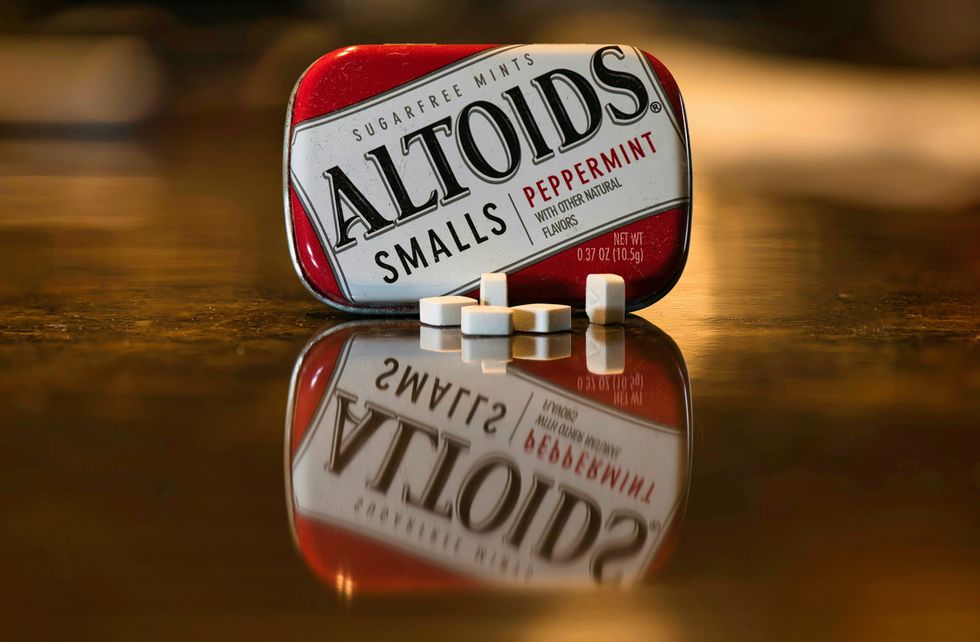
Unsplash
If there’s a signature candy for the holiday season, it’s probably a candy cane — which automatically puts peppermint in the running for being an official holiday scent. Pretty much, in any form, it’s got your sex life’s back because it’s hailed as being a sexual stimulant; in part, because its smell is so invigorating. Plus, it helps to (eh hem) ease headaches, it gives you more energy and it can definitely help to freshen your breath. Also, that minty sensation? The same thing that I said about cinnamon can apply to peppermint too (if you catch my drift).
5. Ginger

Unsplash
Whether it’s in a meal or in your bedroom, ginger is going to produce results that are hella spicy. On the sex tip, science has praised ginger for being able to increase sexual arousal, improve blood circulation (which intensifies orgasms) and strengthen fertility for many years. Scent-wise, I find it to be one that both men and women enjoy because it is both woodsy and sweet. So, if you’ve got some massage oil in mind, adding some ginger is a way to please you both.
6. Pomegranate
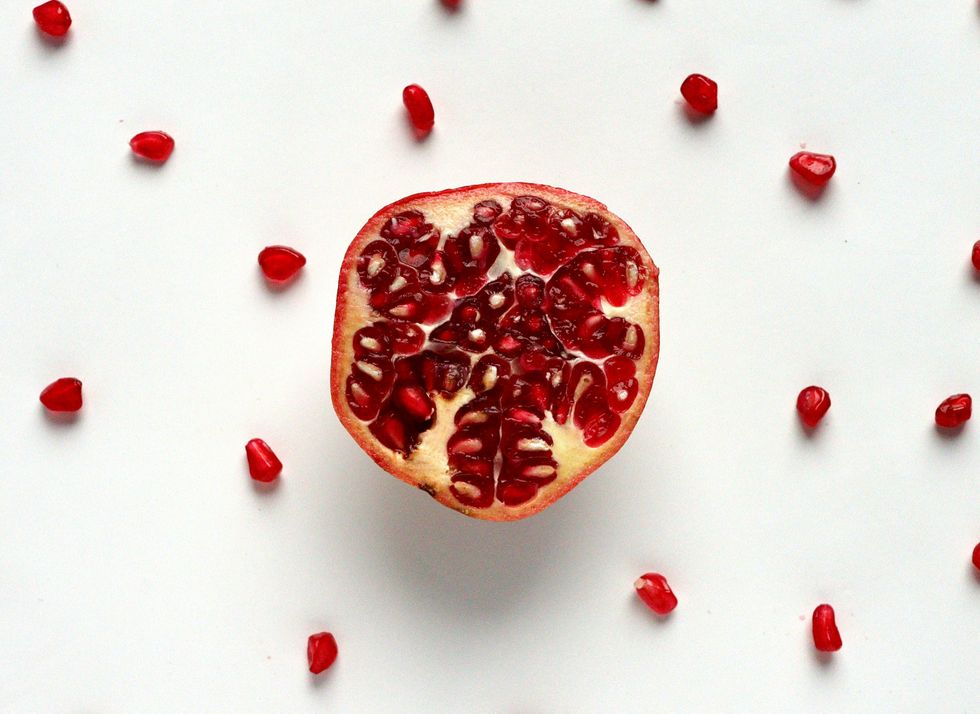
Unsplash
September through December is the time of year when pomegranates are considered to be in season. And, as someone who is a Rosh Hashanah observer, I have a personal adoration for them because I am aware of the various things that they symbolize in Hebrew culture including the fact that they are a fruit that represents love and fertility. So yeah, they would absolutely be an aphrodisiac — one that is perfect for this time of the year. While consuming it helps to boost testosterone levels in both men and women, the floral bittersweet smell that it produces can help to reduce stress while promoting relaxation (like most floral scents do) — and the more relaxed you are, the easier it is to climax.
7. Nutmeg
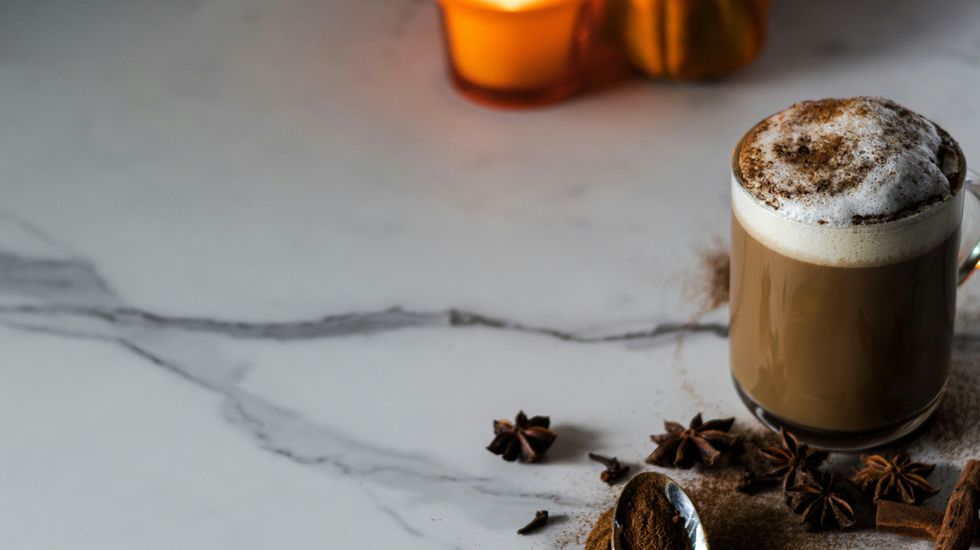
Unsplash
Another signature seasoning during the holiday season is nutmeg. It’s perfect in Thanksgiving sweet potato (or pumpkin) pie and Christmas morning French toast. And yes, it can also make your sex life better. If you consume it, it can intensify your libido and, overall, its warm-meets-spicy-meets-sweet smell is so inviting that it is considered to be a pretty seductive scent.
8. Cloves
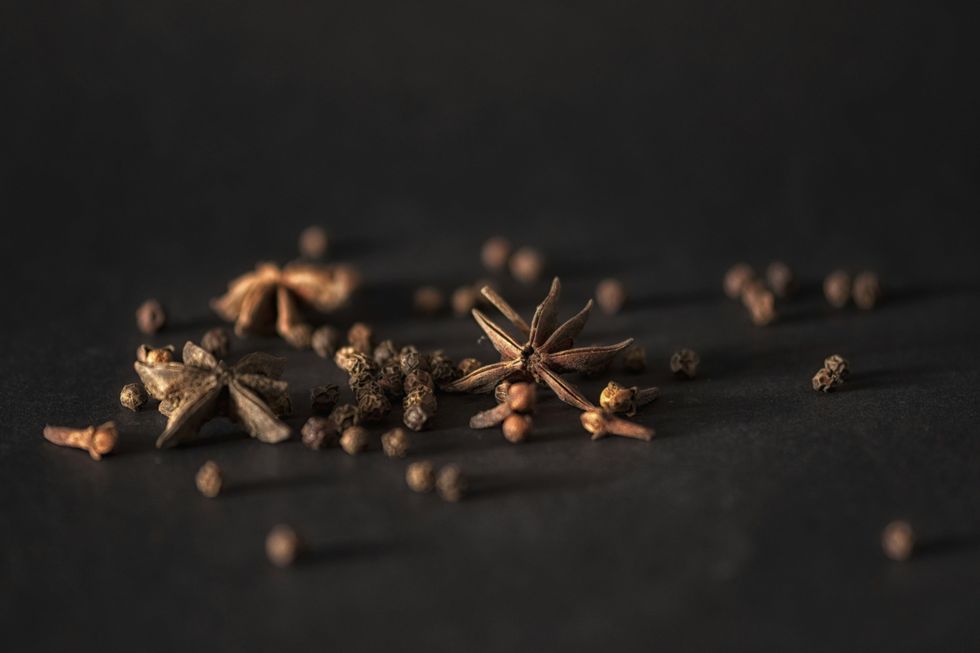
Unsplash
I ain’t got not one lie to tell you — if you’ve got a toothache, put some clove oil on that bad boy and send me a Christmas present for putting you on game. Aside from that, as I round all of this out, cloves are another holiday scent that can do wonders for your sex life. For men, it has the ability to significantly increase sexual arousal and improve stamina and endurance. For men and women alike, it also has a reputation for strengthening sexual desire. And for women solely? Well, if you want an all-natural way to increase natural lubrication down below — the scent and and feel (in DILUTED oil form) can make that happen. It can make the holidays especially special…if you know what I mean.
Ah yes — the atmosphere of the holidays and what it can do.
Take it all in! Scent ‘n whatever stimulating that comes with it! #wink
Let’s make things inbox official! Sign up for the xoNecole newsletter for love, wellness, career, and exclusive content delivered straight to your inbox.
Featured image by Giphy








